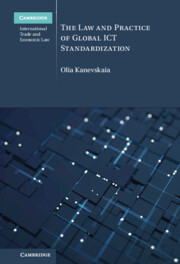
-
Select format
-
- Publisher:
- Cambridge University Press
- Publication date:
- February 2023
- February 2023
- ISBN:
- 9781009300551
- 9781009300575
- Dimensions:
- (229 x 152 mm)
- Weight & Pages:
- 0.73kg, 388 Pages
- Dimensions:
- Weight & Pages:
You may already have access via personal or institutional login
Book description
This book presents a first comprehensive effort to explore the mechanics and fundamentals of global ICT standardization. It offers a comprehensive study of legal rules governing ICT standardization; systematically analyses governance and institutional features of some most prominent Standards Development Organizations; and presents qualitative empirical evidence on implementation of these rules in practice. By evaluating legal and procedural rules in light of current practices and tendencies in the industry, the book explores various options available for disciplining ICT standardization from the viewpoint of the applicable legislation, judiciary, and internal governance rules of Standards Development Organizations and offers practical solutions on how to increase the legitimacy of ICT standards. Adding to the previous theoretical approach to the field of standardization from historical, legal and political science perspective, this book applies theoretical considerations to unexplored scenarios, offering a holistic picture of ICT standardization and providing a novel contribution to the field.
Reviews
‘Strengths abound in this book, providing a comprehensive analysis of global ICT standardization from historical, legal and political science perspectives. It provides an holistic understanding of the subject matter, with well-structured chapters that guide readers through clear definitions of key concepts … It is a valuable resource for researchers, academics, lawyers and policy-makers.’
Source: International and Comparative Law Quarterly
Contents
Metrics
Altmetric attention score
Full text views
Full text views help Loading metrics...
Loading metrics...
* Views captured on Cambridge Core between #date#. This data will be updated every 24 hours.
Usage data cannot currently be displayed.
Accessibility standard: Unknown
Why this information is here
This section outlines the accessibility features of this content - including support for screen readers, full keyboard navigation and high-contrast display options. This may not be relevant for you.
Accessibility Information
Accessibility compliance for the PDF of this book is currently unknown and may be updated in the future.


